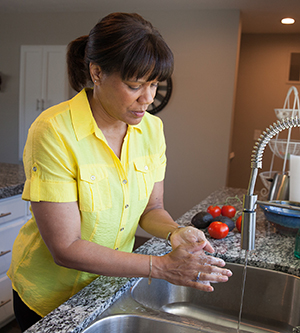Cryptosporidium Infection (Cryptosporidiosis)
Cryptosporidium infection is an illness that affects your intestines. It's also called cryptosporidiosis. It is caused by the parasite Cryptosporidium. This parasite is found in the stool of infected people or animals, which can then contaminate food or water. People are often infected by contaminated water.
Common symptoms of Cryptosporidium infection
The main symptom is watery diarrhea. This starts about 2 to 10 days after exposure. You may also have stomach cramps, nausea and vomiting, or a fever.
Diagnosing Cryptosporidium infection
A sample of your stool is checked for the parasite. More than 1 stool sample may be needed.
Treating Cryptosporidium infection
Most people get better in 1 to 2 weeks. But symptoms last longer in some people. Treatment is rarely needed. But the disease can be more serious in people with a weakened immune system. They may need to take antibiotics for the infection. While you are recovering, drink plenty of fluids. This helps prevent dehydration. Don't take antidiarrheal medicine unless your healthcare provider instructs you to. This medicine can prevent your body from getting rid of the parasite. It can also make the illness last longer.
When to call the healthcare provider
Call your healthcare provider if you have:
-
Bloody stool
-
Severe vomiting
-
Severe belly pain
-
Signs of dehydration:
-
Dry, sticky mouth
-
Very little urine
-
Very dark urine
Preventing Cryptosporidium infection
 |
| Wash your hands often to prevent spreading Cryptosporidium infection. |
Follow these steps to reduce the chances of getting or passing on this infection :
-
Don’t swallow or drink water straight from pools, lakes, streams, or rivers. When traveling outside the country or camping, don't drink, wash fruits or vegetables, or cook with water unless you know it’s safe. Boil any water you use for at least 60 seconds first. Or use a camping water filter or purifier or chlorine dioxide drops or pills, as directed on their instructions.
-
If you drink well water, have it tested once a year for germs. Be sure the test includes Cryptosporidium.
-
Wash your hands for at least 20 seconds with soap and clean, running water. Do this often. Make sure to wash before preparing meals. Wash after going to the bathroom, changing diapers, working in the garden, caring for someone who has diarrhea, or handling pets. Teach your child to do the same.
-
Use a food thermometer when cooking. Cook poultry to at least 165°F (74°C). Cook pork and ground meats to at least 160°F (71°C). Cook beef or lamb to at least 145°F (63°C).
-
Wash fruits and vegetables well before eating them.
-
If you are infected with Cryptosporidium , talk with your healthcare provider about special safety steps to take.
© 2000-2024 The StayWell Company, LLC. All rights reserved. This information is not intended as a substitute for professional medical care. Always follow your healthcare professional's instructions.